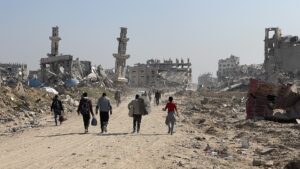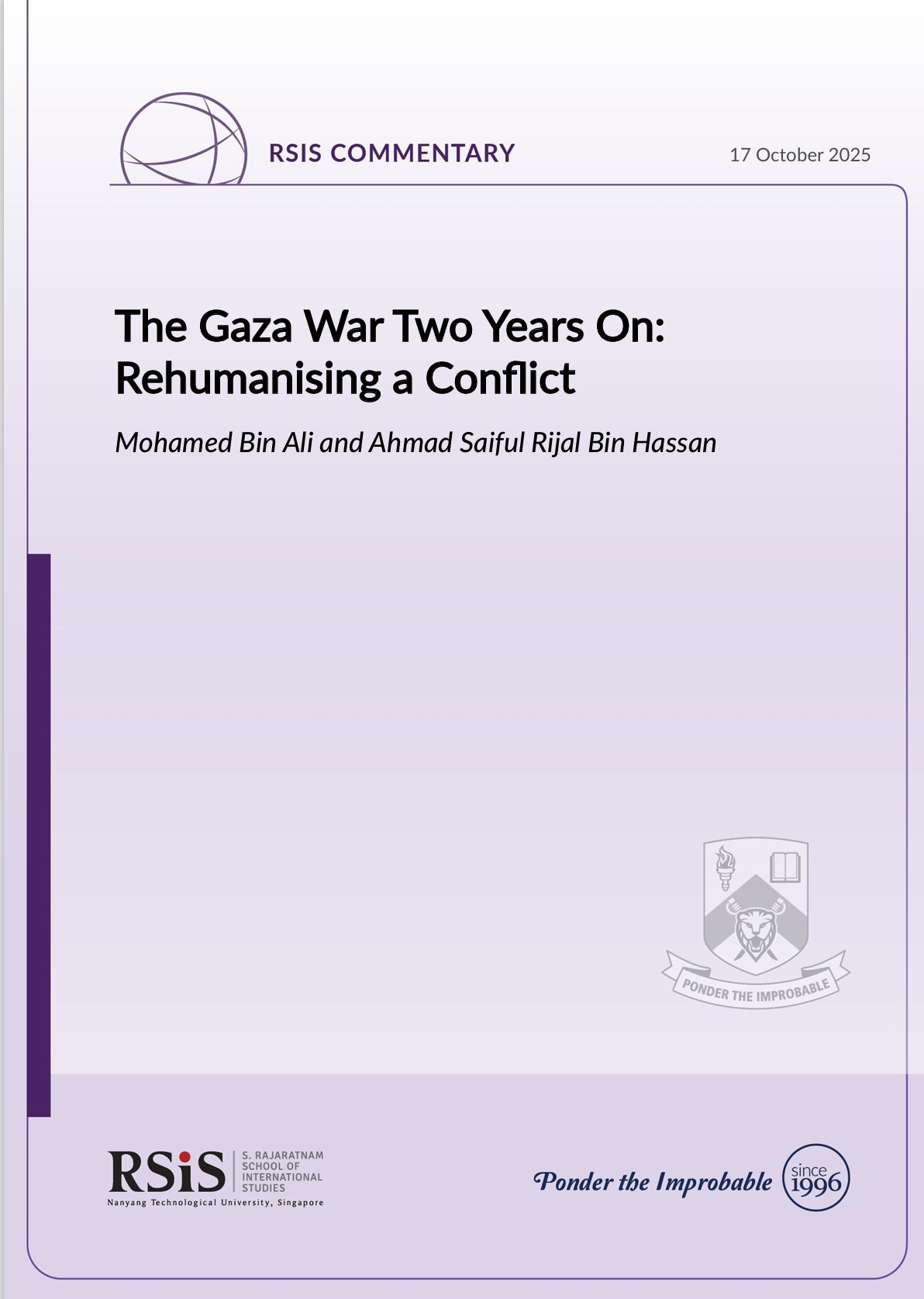17 October 2025
- RSIS
- Publication
- RSIS Publications
- The Gaza War Two Years On: Rehumanising a Conflict
SYNOPSIS
Two years after the 7th of October 2023, the conflict in Gaza continues to shape the region’s politics and morality. Only through a conscious rehumanisation can the cycle of violence be broken, giving a chance for peaceful coexistence to become a reality.

COMMENTARY
The October 7th Hamas assault on Israel marked one of the most consequential turning points in the history of the Israeli-Palestinian conflict. Yet, it was neither the beginning nor the root of the conflict. For decades, the Israeli-Palestinian struggle has been shaped by violence, occupation, illegal settlements and failed peace processes that undermined prospects for peaceful coexistence.
Against this backdrop, Hamas’ surprise attack on October 7th was both a sign of deeper structural issues as well as a strategic breach. For Israelis, it represented the deadliest assault in recent history, shattering their sense of security. For Palestinians, Israel’s unrelenting military response brought devastation of historic proportions, leaving tens of thousands dead, millions displaced, and much of Gaza reduced to rubble.
For the region and the world, the past two years have further strained relations and exposed how entrenched the cycles of dehumanisation are in the Israeli-Palestinian conflict, which in turn, sustain the violence on both sides.
Dehumanisation as Core Conflict
The October 7th attacks should not be viewed in isolation. The cycle of dehumanisation has long been part of the larger conflict. After decades of blockade, asymmetric warfare, and mutual distrust, a distinct and real worldview emerges that reduces human beings to instruments of political struggle.
For one, both Hamas and Israel’s right-wing leadership have cultivated narratives that sanctify their own suffering while denying that of the other. Hamas frames armed resistance as a sacred duty and portrays Israeli civilians as extensions of the occupation, erasing moral distinctions between combatants and non-combatants. On the other hand, influential voices within Israel’s far-right political spectrum have normalised rhetoric that depicts Palestinians collectively as security threats, thereby legitimising indiscriminate military actions and the continued blockade.
A recent survey conducted paints a stark picture of how trust between Israelis and Palestinians has hit an all-time low. 62% of Israeli respondents agree with the statement that “there are no innocent people in Gaza”. The majority of Palestinians, on the other hand, are sceptical that peace would be achieved with the Israelis.
These parallel processes of radicalisation have influenced one another, creating a moral feedback loop in which victimhood is weaponised and empathy is perceived as weakness. In this environment, violence becomes self-justifying, not merely as a strategic choice but as a moral posture. What is happening in Gaza lies not only in its physical destruction, but in how competing narratives of righteousness have eroded the shared recognition of human worth that is essential for peace.
Rehumanisation as Conflict Resolution
For any peace to take root, rehumanisation must be a deliberate pillar of post-conflict reconstruction, not an afterthought to ceasefire diplomacy. While political negotiations focus on borders and security, rehumanisation targets the deeper moral and psychological domain. It neither denies the asymmetry of power nor equates the actions of both sides, but aims to restore the moral capacity for empathy and restraint that has been eroded by prolonged violence.
At the societal level, rehumanisation involves reshaping public narratives and institutions to cultivate empathy and shared moral responsibility. This means reorienting education, religious teaching, and media discourse toward acknowledging universal human vulnerability and historical complexity. For both Palestinians and Israelis, the rehumanisation of the “other” must become a civic imperative. It is essential to understand that moral legitimacy cannot be founded on collective punishment or the denial of suffering.
Beyond immediate ceasefires, rehumanisation requires a commitment to structural and relational changes, including equal protection for civilians, accountability under international law, and sustained people-to-people engagement. Initiatives that promote collaborative reconstruction, interfaith dialogue, and trauma healing can gradually replace fear with a sense of familiarity. While these measures will not erase the scars of October 7th, they can help avert future ones by reconstructing the moral edifice essential for coexistence.
Some grassroots organisations already embody this vision. Founded in 2015, Standing Together, a Jewish-Palestinian movement for peace, equality, and climate justice, represent efforts to uphold the rights and dignity of both peoples. The group has been active, locally and internationally, promoting coexistence between Palestinians and Israelis. Their work challenges dehumanising narratives and asserts that coexistence requires recognising each side’s legitimate humanity and aspirations.
Conclusion
The memory of October 7th extends beyond immediate devastation. It is evident in the moral and psychological fractures that continue to define the region. Ceasefires, though necessary, are temporary pauses, and true transformation requires rebuilding the ethical and social foundations of coexistence. Rehumanisation provides a pathway through which empathy, recognition, and accountability can counteract cycles of violence and dehumanisation, thereby creating conditions for durable peace.
The lesson for the international community is clear: without deliberately restoring the rights and dignity of all affected communities, political agreements risk remaining fragile and superficial. Sustainable peace will emerge not solely from security arrangements or reconstruction aid, but from a consistent commitment to moral engagement, shared responsibility, and the protection of human dignity.
Ultimately, the enduring challenge of the Israeli-Palestinian conflict lies in the collective ability to see the “other” not as an abstraction, but as a human being whose life and suffering matter equally. Only through a conscious rehumanisation can the cycle of violence be broken, giving a chance for peaceful coexistence to become a reality, someday soon.
About the Authors
Mohamed Bin Ali is a Senior Fellow, and Ahmad Saiful Rijal Bin Hassan is an Associate Research Fellow at the S. Rajaratnam School of International Studies (RSIS), Nanyang Technological University, Singapore. Both studied Islamic law at Al-Azhar University, Cairo and are counsellors with the Religious Rehabilitation Group (RRG).
SYNOPSIS
Two years after the 7th of October 2023, the conflict in Gaza continues to shape the region’s politics and morality. Only through a conscious rehumanisation can the cycle of violence be broken, giving a chance for peaceful coexistence to become a reality.

COMMENTARY
The October 7th Hamas assault on Israel marked one of the most consequential turning points in the history of the Israeli-Palestinian conflict. Yet, it was neither the beginning nor the root of the conflict. For decades, the Israeli-Palestinian struggle has been shaped by violence, occupation, illegal settlements and failed peace processes that undermined prospects for peaceful coexistence.
Against this backdrop, Hamas’ surprise attack on October 7th was both a sign of deeper structural issues as well as a strategic breach. For Israelis, it represented the deadliest assault in recent history, shattering their sense of security. For Palestinians, Israel’s unrelenting military response brought devastation of historic proportions, leaving tens of thousands dead, millions displaced, and much of Gaza reduced to rubble.
For the region and the world, the past two years have further strained relations and exposed how entrenched the cycles of dehumanisation are in the Israeli-Palestinian conflict, which in turn, sustain the violence on both sides.
Dehumanisation as Core Conflict
The October 7th attacks should not be viewed in isolation. The cycle of dehumanisation has long been part of the larger conflict. After decades of blockade, asymmetric warfare, and mutual distrust, a distinct and real worldview emerges that reduces human beings to instruments of political struggle.
For one, both Hamas and Israel’s right-wing leadership have cultivated narratives that sanctify their own suffering while denying that of the other. Hamas frames armed resistance as a sacred duty and portrays Israeli civilians as extensions of the occupation, erasing moral distinctions between combatants and non-combatants. On the other hand, influential voices within Israel’s far-right political spectrum have normalised rhetoric that depicts Palestinians collectively as security threats, thereby legitimising indiscriminate military actions and the continued blockade.
A recent survey conducted paints a stark picture of how trust between Israelis and Palestinians has hit an all-time low. 62% of Israeli respondents agree with the statement that “there are no innocent people in Gaza”. The majority of Palestinians, on the other hand, are sceptical that peace would be achieved with the Israelis.
These parallel processes of radicalisation have influenced one another, creating a moral feedback loop in which victimhood is weaponised and empathy is perceived as weakness. In this environment, violence becomes self-justifying, not merely as a strategic choice but as a moral posture. What is happening in Gaza lies not only in its physical destruction, but in how competing narratives of righteousness have eroded the shared recognition of human worth that is essential for peace.
Rehumanisation as Conflict Resolution
For any peace to take root, rehumanisation must be a deliberate pillar of post-conflict reconstruction, not an afterthought to ceasefire diplomacy. While political negotiations focus on borders and security, rehumanisation targets the deeper moral and psychological domain. It neither denies the asymmetry of power nor equates the actions of both sides, but aims to restore the moral capacity for empathy and restraint that has been eroded by prolonged violence.
At the societal level, rehumanisation involves reshaping public narratives and institutions to cultivate empathy and shared moral responsibility. This means reorienting education, religious teaching, and media discourse toward acknowledging universal human vulnerability and historical complexity. For both Palestinians and Israelis, the rehumanisation of the “other” must become a civic imperative. It is essential to understand that moral legitimacy cannot be founded on collective punishment or the denial of suffering.
Beyond immediate ceasefires, rehumanisation requires a commitment to structural and relational changes, including equal protection for civilians, accountability under international law, and sustained people-to-people engagement. Initiatives that promote collaborative reconstruction, interfaith dialogue, and trauma healing can gradually replace fear with a sense of familiarity. While these measures will not erase the scars of October 7th, they can help avert future ones by reconstructing the moral edifice essential for coexistence.
Some grassroots organisations already embody this vision. Founded in 2015, Standing Together, a Jewish-Palestinian movement for peace, equality, and climate justice, represent efforts to uphold the rights and dignity of both peoples. The group has been active, locally and internationally, promoting coexistence between Palestinians and Israelis. Their work challenges dehumanising narratives and asserts that coexistence requires recognising each side’s legitimate humanity and aspirations.
Conclusion
The memory of October 7th extends beyond immediate devastation. It is evident in the moral and psychological fractures that continue to define the region. Ceasefires, though necessary, are temporary pauses, and true transformation requires rebuilding the ethical and social foundations of coexistence. Rehumanisation provides a pathway through which empathy, recognition, and accountability can counteract cycles of violence and dehumanisation, thereby creating conditions for durable peace.
The lesson for the international community is clear: without deliberately restoring the rights and dignity of all affected communities, political agreements risk remaining fragile and superficial. Sustainable peace will emerge not solely from security arrangements or reconstruction aid, but from a consistent commitment to moral engagement, shared responsibility, and the protection of human dignity.
Ultimately, the enduring challenge of the Israeli-Palestinian conflict lies in the collective ability to see the “other” not as an abstraction, but as a human being whose life and suffering matter equally. Only through a conscious rehumanisation can the cycle of violence be broken, giving a chance for peaceful coexistence to become a reality, someday soon.
About the Authors
Mohamed Bin Ali is a Senior Fellow, and Ahmad Saiful Rijal Bin Hassan is an Associate Research Fellow at the S. Rajaratnam School of International Studies (RSIS), Nanyang Technological University, Singapore. Both studied Islamic law at Al-Azhar University, Cairo and are counsellors with the Religious Rehabilitation Group (RRG).





